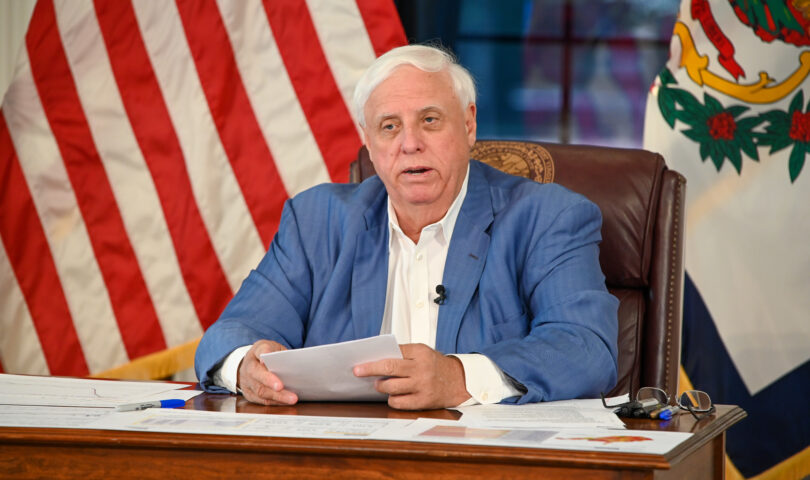Gov. Jim Justice began Wednesday’s COVID-19 press conference as he always does, adding to the state’s tally of the dead.
Twenty-two additional deaths since Monday brought West Virginia’s total to 3,998. Eleven of the 22 deaths were a result of the Bureau for Public Health’s continuing data reconciliation with official death certificates.
Key metrics including active cases, hospitalizations and ICU cases continue to trend down overall for the state. Justice presented charts showing the steady decline, starting at what is believed to be the peak of the Delta surge on Sept. 16, when the state recorded 29,744 active cases.
Wednesday’s active cases were down to 9,703 and while hospitalizations were down from a September high of 1,012 to 829, ventilation cases continued a slight upward trend from 157 on Oct. 8 to 175.
“Our new cases have come down precipitously, which is good news, but our hospital numbers, while improved from our high during this surge, are still quite high,” Dr. Clay Marsh cautioned.
All three hospital metrics: hospitalization, ICU cases and ventilation cases, are all far above the peaks during the state’s last surge in January.
The end of the second round of the “Do it for BabyDog” vaccine incentive program on Tuesday was celebrated with a commemorative video showing many of the winners Justice and BabyDog had personally visited. It was indicated at Monday’s press conference that a third round of the program may be in the works, but no further details were forthcoming Wednesday.
Justice also took time during the press conference to announce amendments to the state legislature’s special session call. He added two items: a supplemental appropriation of $4 million for the Victims of Crime grants, as well as a bill clarifying that any private business or organization that mandates vaccines must also allow exceptions.
The latter took up the majority of the time during the press conference’s question and answer session.
Many reporters asked how exemptions for a COVID-19 vaccine would not open the door to similar exemptions with more established vaccines, such as measles, mumps and rubella.
“In talking with legislators, in talking with lots of different folks, I felt that it was proper to clarify. To say we’re changing horses in the middle of the stream here, no way.” Justice said. “I believe just as strongly that our businesses should have the right to mandate … it’s none of my business what they do. But if they choose to mandate … we need to follow the law. That’s all I’m trying to do, is just clarify.”
Justice fielded all questions without comment from the medical experts on the call, except in one instance where Dr. Marsh was directly questioned about his involvement with the bill in light of West Virginia University Medicine’s public criticism of the bill.
“In my role helping the state with its response to COVID-19, the governor has been clear about the goal of keeping the state together. Certainly as he considers what’s best for the state, we are supportive of recommending scientific and operational details,” Dr. Marsh said.
He continued, addressing his role at WVU Medicine, saying, “Certainly I play a role at WVU Medicine at the Academic Health Center, but as to policy decisions that organization has questions of, that is more related to WVU Hospital system.”
Both Marsh and Justice were insistent that the exemptions did not change their position that all eligible West Virginians should get vaccinated.
TWEET @DominionPostWV




